Analysis of Recovery Principles in Mental Health: A Lifespan Approach
VerifiedAdded on 2022/08/16
|9
|2245
|11
Report
AI Summary
This report delves into the principles of Recovery-Oriented Mental Health Practice (ROMHP) and its application within a lifespan specialization. It begins with an overview of ROMHP and its national standards, emphasizing the importance of individualized care and promoting empowerment. The report explores the impact of cultural, ethnic, and social backgrounds on mental health literacy and the need for tailored recovery plans, particularly for Aboriginal and Torres Strait Islander (ATSI) populations. Cognitive biases, especially in relation to schizophrenia, are discussed, along with the ethical considerations of respecting service users' choices, autonomy, and dignity. Limitations to ROMHP implementation, such as reasoning biases and lack of knowledge, are examined. The report also addresses various recovery approaches for different mental health conditions, including depression and dementia, and the use of tools like the Hamilton Depression Scale (HAM-D) and DSM-IV to assess recovery rates. The significance of quality of life (QoL) measurements and the specific challenges faced by the ATSI population are also highlighted. The author, drawing from personal experience, underscores the importance of individualized ROMHP for treating mental health complications among the ATSI population. The conclusion reinforces the value of ROMHP while advocating for improved outcome measurement models.
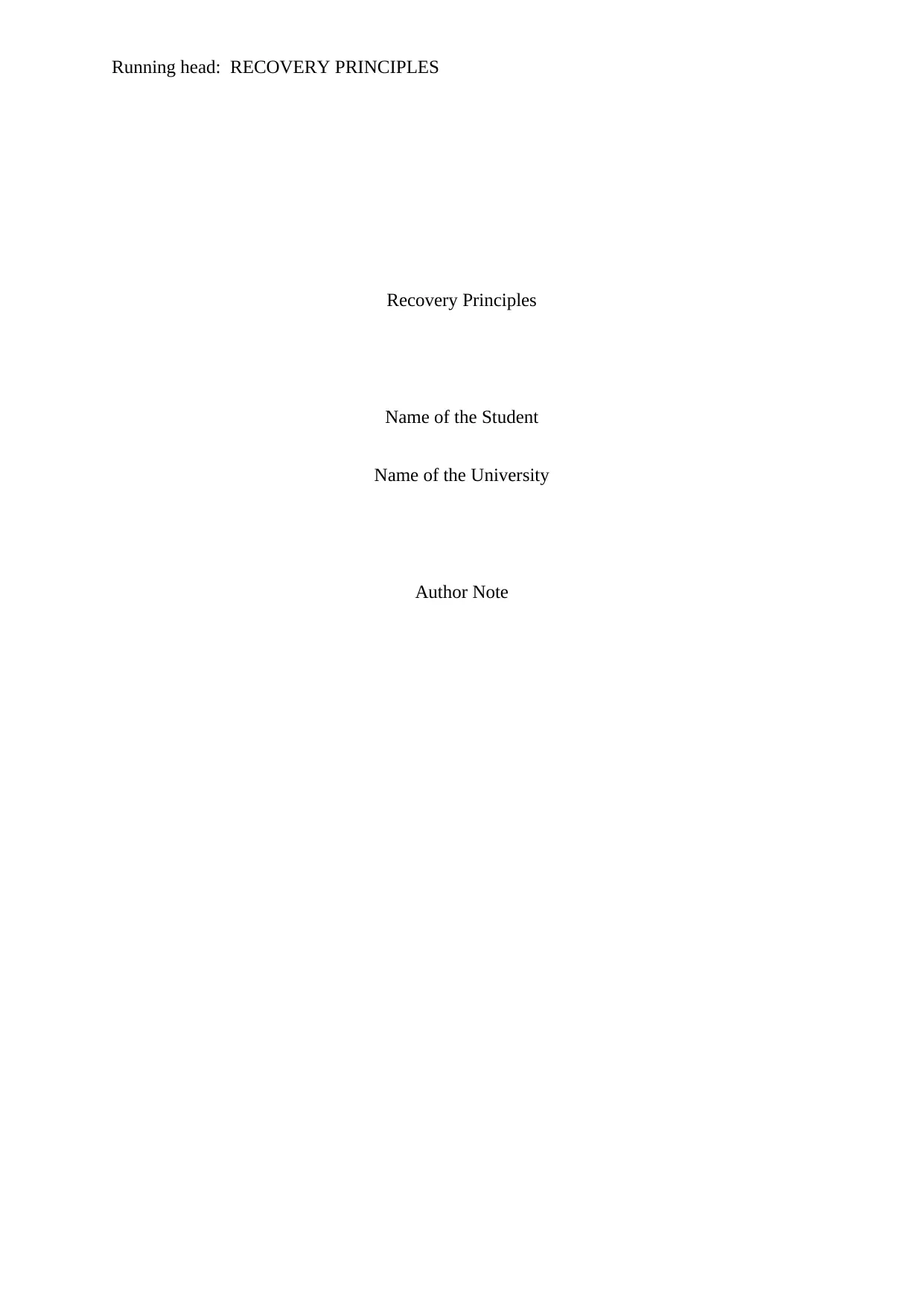
Running head: RECOVERY PRINCIPLES
Recovery Principles
Name of the Student
Name of the University
Author Note
Recovery Principles
Name of the Student
Name of the University
Author Note
Paraphrase This Document
Need a fresh take? Get an instant paraphrase of this document with our AI Paraphraser
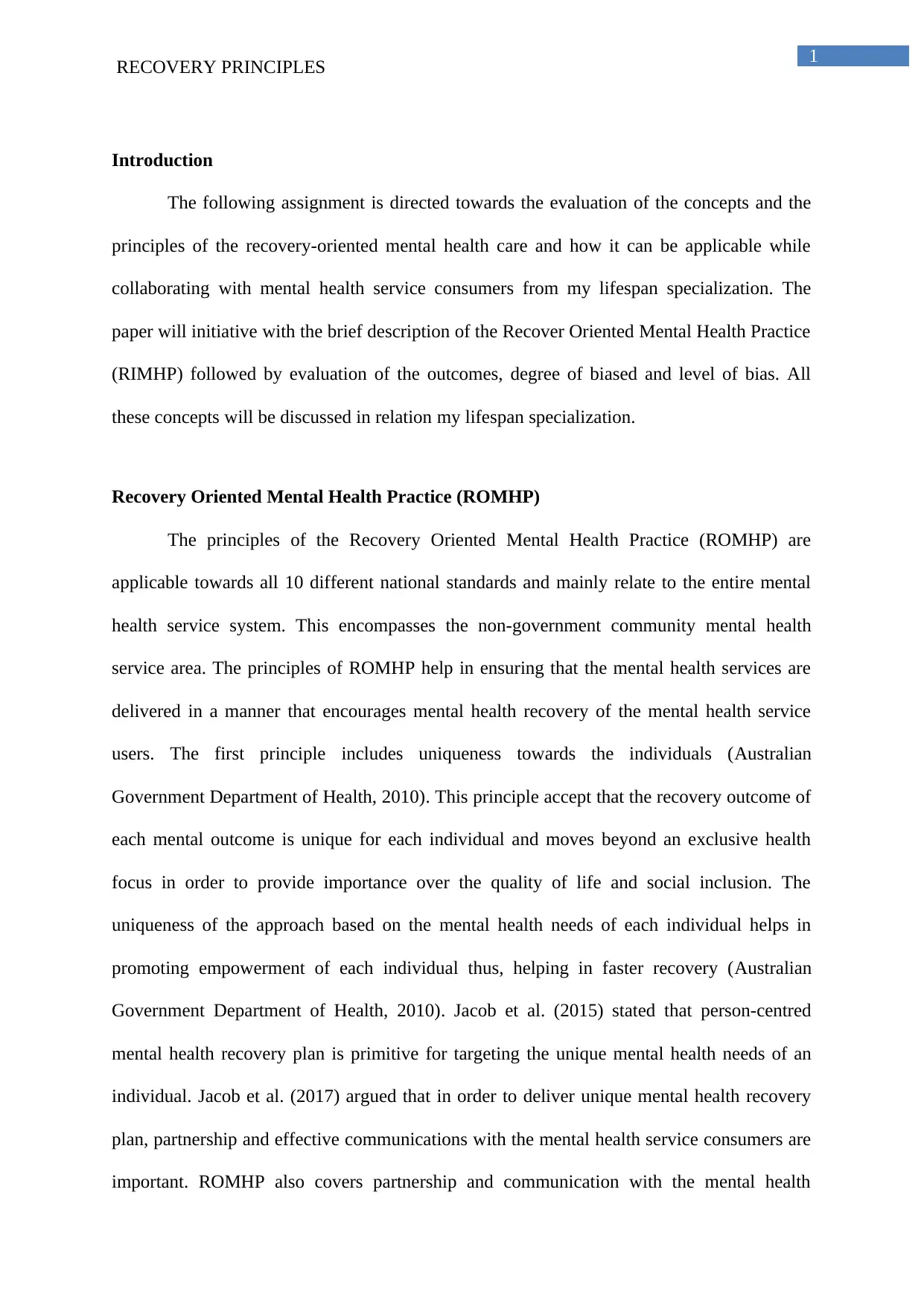
1
RECOVERY PRINCIPLES
Introduction
The following assignment is directed towards the evaluation of the concepts and the
principles of the recovery-oriented mental health care and how it can be applicable while
collaborating with mental health service consumers from my lifespan specialization. The
paper will initiative with the brief description of the Recover Oriented Mental Health Practice
(RIMHP) followed by evaluation of the outcomes, degree of biased and level of bias. All
these concepts will be discussed in relation my lifespan specialization.
Recovery Oriented Mental Health Practice (ROMHP)
The principles of the Recovery Oriented Mental Health Practice (ROMHP) are
applicable towards all 10 different national standards and mainly relate to the entire mental
health service system. This encompasses the non-government community mental health
service area. The principles of ROMHP help in ensuring that the mental health services are
delivered in a manner that encourages mental health recovery of the mental health service
users. The first principle includes uniqueness towards the individuals (Australian
Government Department of Health, 2010). This principle accept that the recovery outcome of
each mental outcome is unique for each individual and moves beyond an exclusive health
focus in order to provide importance over the quality of life and social inclusion. The
uniqueness of the approach based on the mental health needs of each individual helps in
promoting empowerment of each individual thus, helping in faster recovery (Australian
Government Department of Health, 2010). Jacob et al. (2015) stated that person-centred
mental health recovery plan is primitive for targeting the unique mental health needs of an
individual. Jacob et al. (2017) argued that in order to deliver unique mental health recovery
plan, partnership and effective communications with the mental health service consumers are
important. ROMHP also covers partnership and communication with the mental health
RECOVERY PRINCIPLES
Introduction
The following assignment is directed towards the evaluation of the concepts and the
principles of the recovery-oriented mental health care and how it can be applicable while
collaborating with mental health service consumers from my lifespan specialization. The
paper will initiative with the brief description of the Recover Oriented Mental Health Practice
(RIMHP) followed by evaluation of the outcomes, degree of biased and level of bias. All
these concepts will be discussed in relation my lifespan specialization.
Recovery Oriented Mental Health Practice (ROMHP)
The principles of the Recovery Oriented Mental Health Practice (ROMHP) are
applicable towards all 10 different national standards and mainly relate to the entire mental
health service system. This encompasses the non-government community mental health
service area. The principles of ROMHP help in ensuring that the mental health services are
delivered in a manner that encourages mental health recovery of the mental health service
users. The first principle includes uniqueness towards the individuals (Australian
Government Department of Health, 2010). This principle accept that the recovery outcome of
each mental outcome is unique for each individual and moves beyond an exclusive health
focus in order to provide importance over the quality of life and social inclusion. The
uniqueness of the approach based on the mental health needs of each individual helps in
promoting empowerment of each individual thus, helping in faster recovery (Australian
Government Department of Health, 2010). Jacob et al. (2015) stated that person-centred
mental health recovery plan is primitive for targeting the unique mental health needs of an
individual. Jacob et al. (2017) argued that in order to deliver unique mental health recovery
plan, partnership and effective communications with the mental health service consumers are
important. ROMHP also covers partnership and communication with the mental health
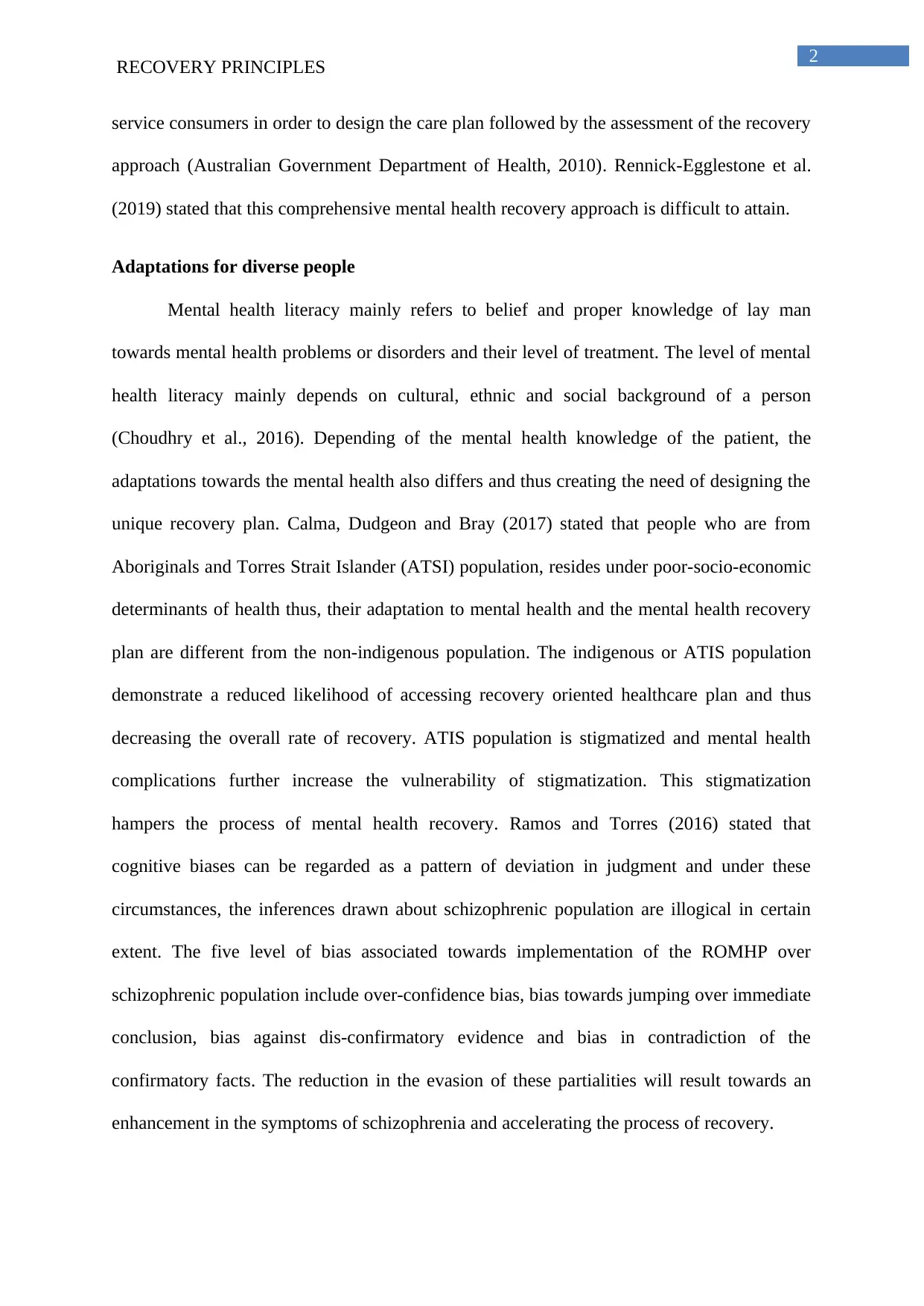
2
RECOVERY PRINCIPLES
service consumers in order to design the care plan followed by the assessment of the recovery
approach (Australian Government Department of Health, 2010). Rennick-Egglestone et al.
(2019) stated that this comprehensive mental health recovery approach is difficult to attain.
Adaptations for diverse people
Mental health literacy mainly refers to belief and proper knowledge of lay man
towards mental health problems or disorders and their level of treatment. The level of mental
health literacy mainly depends on cultural, ethnic and social background of a person
(Choudhry et al., 2016). Depending of the mental health knowledge of the patient, the
adaptations towards the mental health also differs and thus creating the need of designing the
unique recovery plan. Calma, Dudgeon and Bray (2017) stated that people who are from
Aboriginals and Torres Strait Islander (ATSI) population, resides under poor-socio-economic
determinants of health thus, their adaptation to mental health and the mental health recovery
plan are different from the non-indigenous population. The indigenous or ATIS population
demonstrate a reduced likelihood of accessing recovery oriented healthcare plan and thus
decreasing the overall rate of recovery. ATIS population is stigmatized and mental health
complications further increase the vulnerability of stigmatization. This stigmatization
hampers the process of mental health recovery. Ramos and Torres (2016) stated that
cognitive biases can be regarded as a pattern of deviation in judgment and under these
circumstances, the inferences drawn about schizophrenic population are illogical in certain
extent. The five level of bias associated towards implementation of the ROMHP over
schizophrenic population include over-confidence bias, bias towards jumping over immediate
conclusion, bias against dis-confirmatory evidence and bias in contradiction of the
confirmatory facts. The reduction in the evasion of these partialities will result towards an
enhancement in the symptoms of schizophrenia and accelerating the process of recovery.
RECOVERY PRINCIPLES
service consumers in order to design the care plan followed by the assessment of the recovery
approach (Australian Government Department of Health, 2010). Rennick-Egglestone et al.
(2019) stated that this comprehensive mental health recovery approach is difficult to attain.
Adaptations for diverse people
Mental health literacy mainly refers to belief and proper knowledge of lay man
towards mental health problems or disorders and their level of treatment. The level of mental
health literacy mainly depends on cultural, ethnic and social background of a person
(Choudhry et al., 2016). Depending of the mental health knowledge of the patient, the
adaptations towards the mental health also differs and thus creating the need of designing the
unique recovery plan. Calma, Dudgeon and Bray (2017) stated that people who are from
Aboriginals and Torres Strait Islander (ATSI) population, resides under poor-socio-economic
determinants of health thus, their adaptation to mental health and the mental health recovery
plan are different from the non-indigenous population. The indigenous or ATIS population
demonstrate a reduced likelihood of accessing recovery oriented healthcare plan and thus
decreasing the overall rate of recovery. ATIS population is stigmatized and mental health
complications further increase the vulnerability of stigmatization. This stigmatization
hampers the process of mental health recovery. Ramos and Torres (2016) stated that
cognitive biases can be regarded as a pattern of deviation in judgment and under these
circumstances, the inferences drawn about schizophrenic population are illogical in certain
extent. The five level of bias associated towards implementation of the ROMHP over
schizophrenic population include over-confidence bias, bias towards jumping over immediate
conclusion, bias against dis-confirmatory evidence and bias in contradiction of the
confirmatory facts. The reduction in the evasion of these partialities will result towards an
enhancement in the symptoms of schizophrenia and accelerating the process of recovery.
⊘ This is a preview!⊘
Do you want full access?
Subscribe today to unlock all pages.

Trusted by 1+ million students worldwide
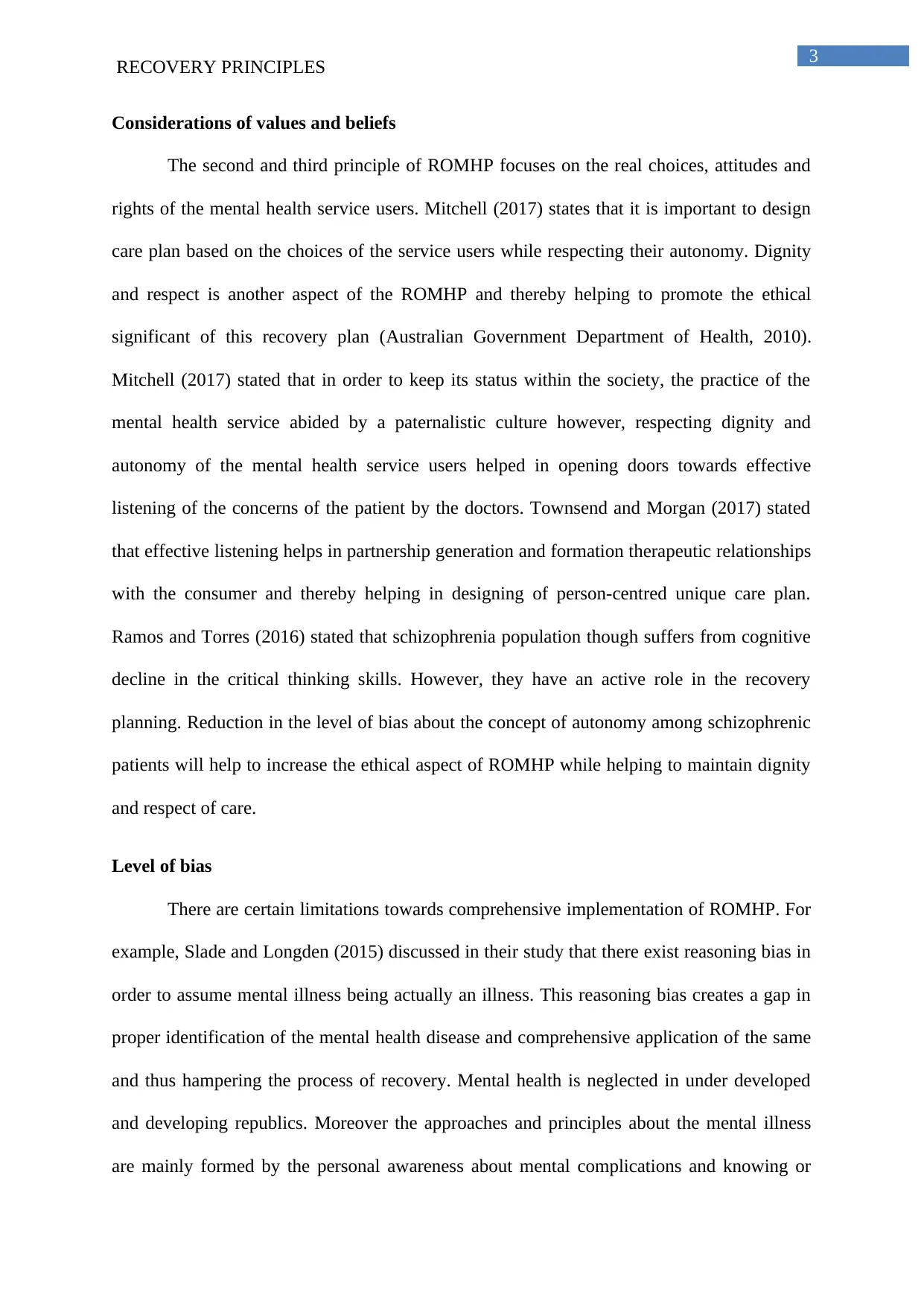
3
RECOVERY PRINCIPLES
Considerations of values and beliefs
The second and third principle of ROMHP focuses on the real choices, attitudes and
rights of the mental health service users. Mitchell (2017) states that it is important to design
care plan based on the choices of the service users while respecting their autonomy. Dignity
and respect is another aspect of the ROMHP and thereby helping to promote the ethical
significant of this recovery plan (Australian Government Department of Health, 2010).
Mitchell (2017) stated that in order to keep its status within the society, the practice of the
mental health service abided by a paternalistic culture however, respecting dignity and
autonomy of the mental health service users helped in opening doors towards effective
listening of the concerns of the patient by the doctors. Townsend and Morgan (2017) stated
that effective listening helps in partnership generation and formation therapeutic relationships
with the consumer and thereby helping in designing of person-centred unique care plan.
Ramos and Torres (2016) stated that schizophrenia population though suffers from cognitive
decline in the critical thinking skills. However, they have an active role in the recovery
planning. Reduction in the level of bias about the concept of autonomy among schizophrenic
patients will help to increase the ethical aspect of ROMHP while helping to maintain dignity
and respect of care.
Level of bias
There are certain limitations towards comprehensive implementation of ROMHP. For
example, Slade and Longden (2015) discussed in their study that there exist reasoning bias in
order to assume mental illness being actually an illness. This reasoning bias creates a gap in
proper identification of the mental health disease and comprehensive application of the same
and thus hampering the process of recovery. Mental health is neglected in under developed
and developing republics. Moreover the approaches and principles about the mental illness
are mainly formed by the personal awareness about mental complications and knowing or
RECOVERY PRINCIPLES
Considerations of values and beliefs
The second and third principle of ROMHP focuses on the real choices, attitudes and
rights of the mental health service users. Mitchell (2017) states that it is important to design
care plan based on the choices of the service users while respecting their autonomy. Dignity
and respect is another aspect of the ROMHP and thereby helping to promote the ethical
significant of this recovery plan (Australian Government Department of Health, 2010).
Mitchell (2017) stated that in order to keep its status within the society, the practice of the
mental health service abided by a paternalistic culture however, respecting dignity and
autonomy of the mental health service users helped in opening doors towards effective
listening of the concerns of the patient by the doctors. Townsend and Morgan (2017) stated
that effective listening helps in partnership generation and formation therapeutic relationships
with the consumer and thereby helping in designing of person-centred unique care plan.
Ramos and Torres (2016) stated that schizophrenia population though suffers from cognitive
decline in the critical thinking skills. However, they have an active role in the recovery
planning. Reduction in the level of bias about the concept of autonomy among schizophrenic
patients will help to increase the ethical aspect of ROMHP while helping to maintain dignity
and respect of care.
Level of bias
There are certain limitations towards comprehensive implementation of ROMHP. For
example, Slade and Longden (2015) discussed in their study that there exist reasoning bias in
order to assume mental illness being actually an illness. This reasoning bias creates a gap in
proper identification of the mental health disease and comprehensive application of the same
and thus hampering the process of recovery. Mental health is neglected in under developed
and developing republics. Moreover the approaches and principles about the mental illness
are mainly formed by the personal awareness about mental complications and knowing or
Paraphrase This Document
Need a fresh take? Get an instant paraphrase of this document with our AI Paraphraser
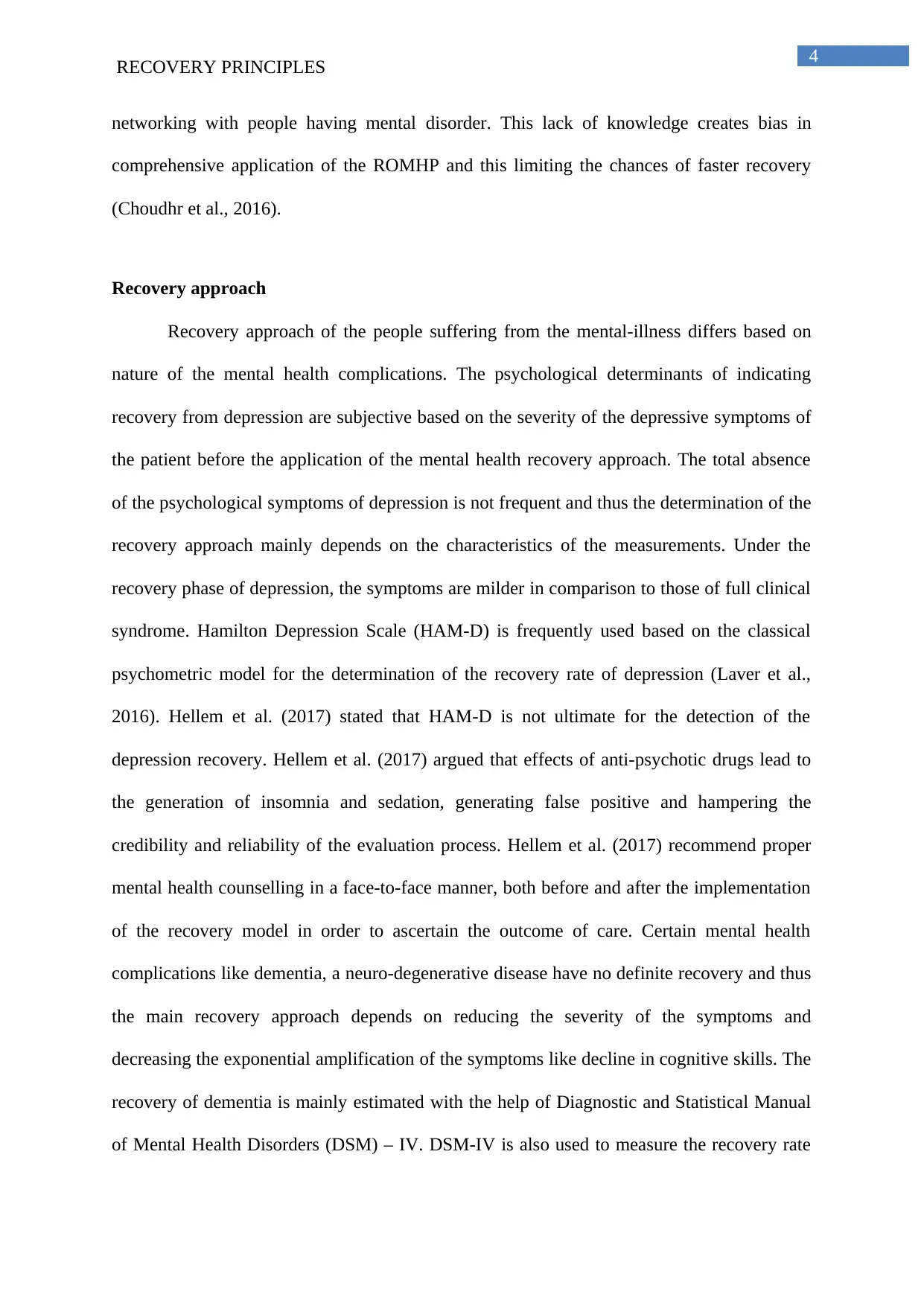
4
RECOVERY PRINCIPLES
networking with people having mental disorder. This lack of knowledge creates bias in
comprehensive application of the ROMHP and this limiting the chances of faster recovery
(Choudhr et al., 2016).
Recovery approach
Recovery approach of the people suffering from the mental-illness differs based on
nature of the mental health complications. The psychological determinants of indicating
recovery from depression are subjective based on the severity of the depressive symptoms of
the patient before the application of the mental health recovery approach. The total absence
of the psychological symptoms of depression is not frequent and thus the determination of the
recovery approach mainly depends on the characteristics of the measurements. Under the
recovery phase of depression, the symptoms are milder in comparison to those of full clinical
syndrome. Hamilton Depression Scale (HAM-D) is frequently used based on the classical
psychometric model for the determination of the recovery rate of depression (Laver et al.,
2016). Hellem et al. (2017) stated that HAM-D is not ultimate for the detection of the
depression recovery. Hellem et al. (2017) argued that effects of anti-psychotic drugs lead to
the generation of insomnia and sedation, generating false positive and hampering the
credibility and reliability of the evaluation process. Hellem et al. (2017) recommend proper
mental health counselling in a face-to-face manner, both before and after the implementation
of the recovery model in order to ascertain the outcome of care. Certain mental health
complications like dementia, a neuro-degenerative disease have no definite recovery and thus
the main recovery approach depends on reducing the severity of the symptoms and
decreasing the exponential amplification of the symptoms like decline in cognitive skills. The
recovery of dementia is mainly estimated with the help of Diagnostic and Statistical Manual
of Mental Health Disorders (DSM) – IV. DSM-IV is also used to measure the recovery rate
RECOVERY PRINCIPLES
networking with people having mental disorder. This lack of knowledge creates bias in
comprehensive application of the ROMHP and this limiting the chances of faster recovery
(Choudhr et al., 2016).
Recovery approach
Recovery approach of the people suffering from the mental-illness differs based on
nature of the mental health complications. The psychological determinants of indicating
recovery from depression are subjective based on the severity of the depressive symptoms of
the patient before the application of the mental health recovery approach. The total absence
of the psychological symptoms of depression is not frequent and thus the determination of the
recovery approach mainly depends on the characteristics of the measurements. Under the
recovery phase of depression, the symptoms are milder in comparison to those of full clinical
syndrome. Hamilton Depression Scale (HAM-D) is frequently used based on the classical
psychometric model for the determination of the recovery rate of depression (Laver et al.,
2016). Hellem et al. (2017) stated that HAM-D is not ultimate for the detection of the
depression recovery. Hellem et al. (2017) argued that effects of anti-psychotic drugs lead to
the generation of insomnia and sedation, generating false positive and hampering the
credibility and reliability of the evaluation process. Hellem et al. (2017) recommend proper
mental health counselling in a face-to-face manner, both before and after the implementation
of the recovery model in order to ascertain the outcome of care. Certain mental health
complications like dementia, a neuro-degenerative disease have no definite recovery and thus
the main recovery approach depends on reducing the severity of the symptoms and
decreasing the exponential amplification of the symptoms like decline in cognitive skills. The
recovery of dementia is mainly estimated with the help of Diagnostic and Statistical Manual
of Mental Health Disorders (DSM) – IV. DSM-IV is also used to measure the recovery rate
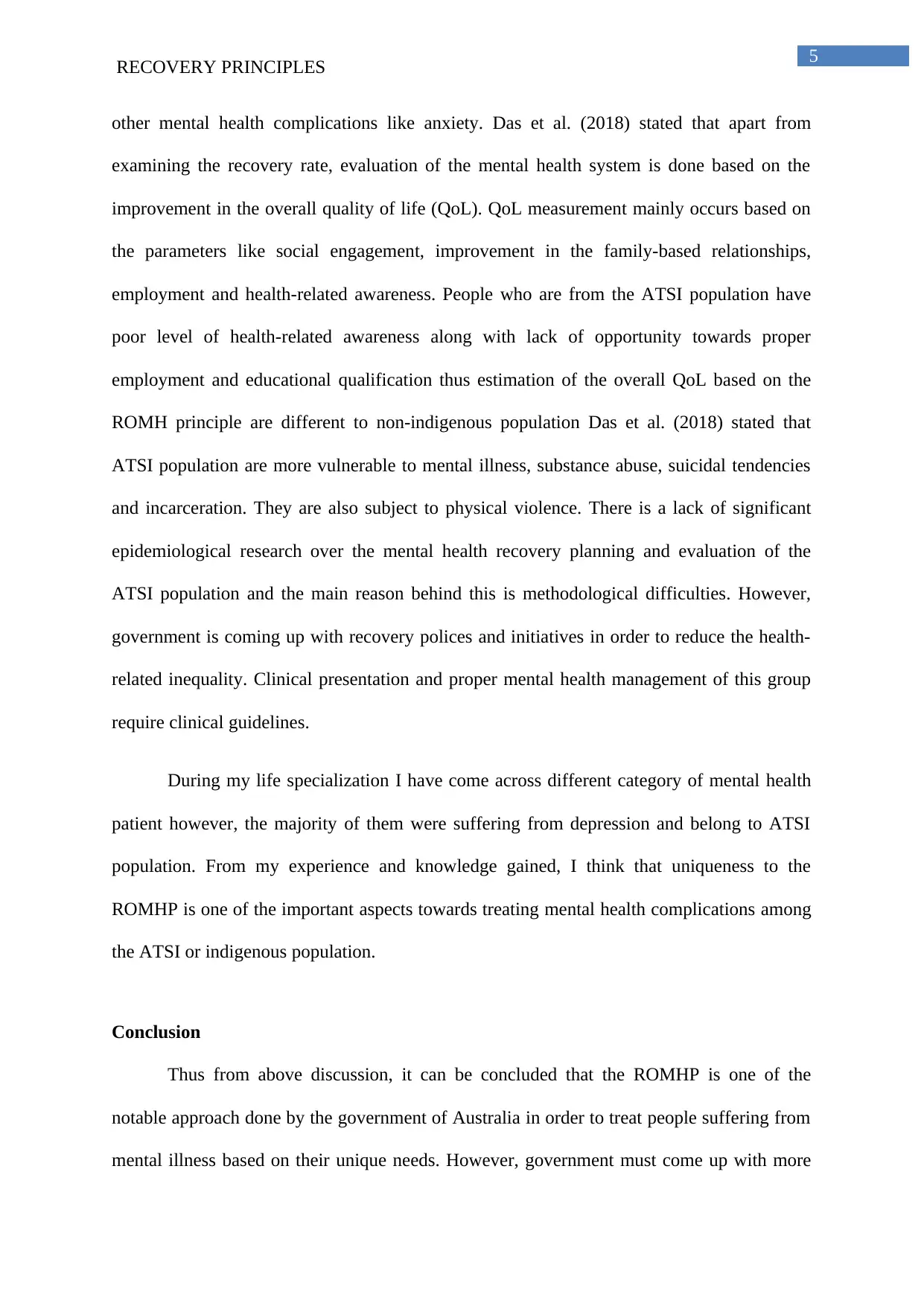
5
RECOVERY PRINCIPLES
other mental health complications like anxiety. Das et al. (2018) stated that apart from
examining the recovery rate, evaluation of the mental health system is done based on the
improvement in the overall quality of life (QoL). QoL measurement mainly occurs based on
the parameters like social engagement, improvement in the family-based relationships,
employment and health-related awareness. People who are from the ATSI population have
poor level of health-related awareness along with lack of opportunity towards proper
employment and educational qualification thus estimation of the overall QoL based on the
ROMH principle are different to non-indigenous population Das et al. (2018) stated that
ATSI population are more vulnerable to mental illness, substance abuse, suicidal tendencies
and incarceration. They are also subject to physical violence. There is a lack of significant
epidemiological research over the mental health recovery planning and evaluation of the
ATSI population and the main reason behind this is methodological difficulties. However,
government is coming up with recovery polices and initiatives in order to reduce the health-
related inequality. Clinical presentation and proper mental health management of this group
require clinical guidelines.
During my life specialization I have come across different category of mental health
patient however, the majority of them were suffering from depression and belong to ATSI
population. From my experience and knowledge gained, I think that uniqueness to the
ROMHP is one of the important aspects towards treating mental health complications among
the ATSI or indigenous population.
Conclusion
Thus from above discussion, it can be concluded that the ROMHP is one of the
notable approach done by the government of Australia in order to treat people suffering from
mental illness based on their unique needs. However, government must come up with more
RECOVERY PRINCIPLES
other mental health complications like anxiety. Das et al. (2018) stated that apart from
examining the recovery rate, evaluation of the mental health system is done based on the
improvement in the overall quality of life (QoL). QoL measurement mainly occurs based on
the parameters like social engagement, improvement in the family-based relationships,
employment and health-related awareness. People who are from the ATSI population have
poor level of health-related awareness along with lack of opportunity towards proper
employment and educational qualification thus estimation of the overall QoL based on the
ROMH principle are different to non-indigenous population Das et al. (2018) stated that
ATSI population are more vulnerable to mental illness, substance abuse, suicidal tendencies
and incarceration. They are also subject to physical violence. There is a lack of significant
epidemiological research over the mental health recovery planning and evaluation of the
ATSI population and the main reason behind this is methodological difficulties. However,
government is coming up with recovery polices and initiatives in order to reduce the health-
related inequality. Clinical presentation and proper mental health management of this group
require clinical guidelines.
During my life specialization I have come across different category of mental health
patient however, the majority of them were suffering from depression and belong to ATSI
population. From my experience and knowledge gained, I think that uniqueness to the
ROMHP is one of the important aspects towards treating mental health complications among
the ATSI or indigenous population.
Conclusion
Thus from above discussion, it can be concluded that the ROMHP is one of the
notable approach done by the government of Australia in order to treat people suffering from
mental illness based on their unique needs. However, government must come up with more
⊘ This is a preview!⊘
Do you want full access?
Subscribe today to unlock all pages.

Trusted by 1+ million students worldwide
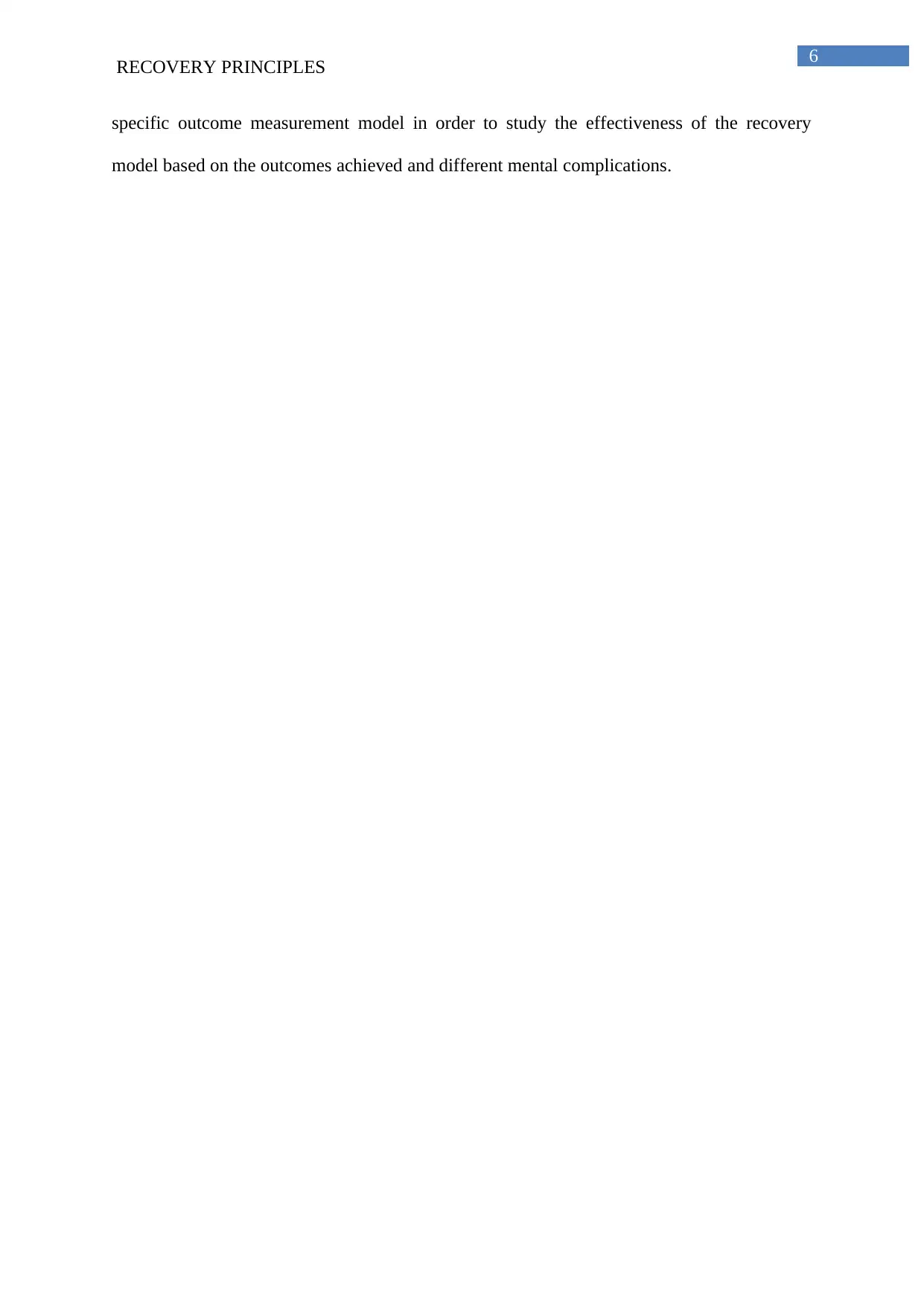
6
RECOVERY PRINCIPLES
specific outcome measurement model in order to study the effectiveness of the recovery
model based on the outcomes achieved and different mental complications.
RECOVERY PRINCIPLES
specific outcome measurement model in order to study the effectiveness of the recovery
model based on the outcomes achieved and different mental complications.
Paraphrase This Document
Need a fresh take? Get an instant paraphrase of this document with our AI Paraphraser
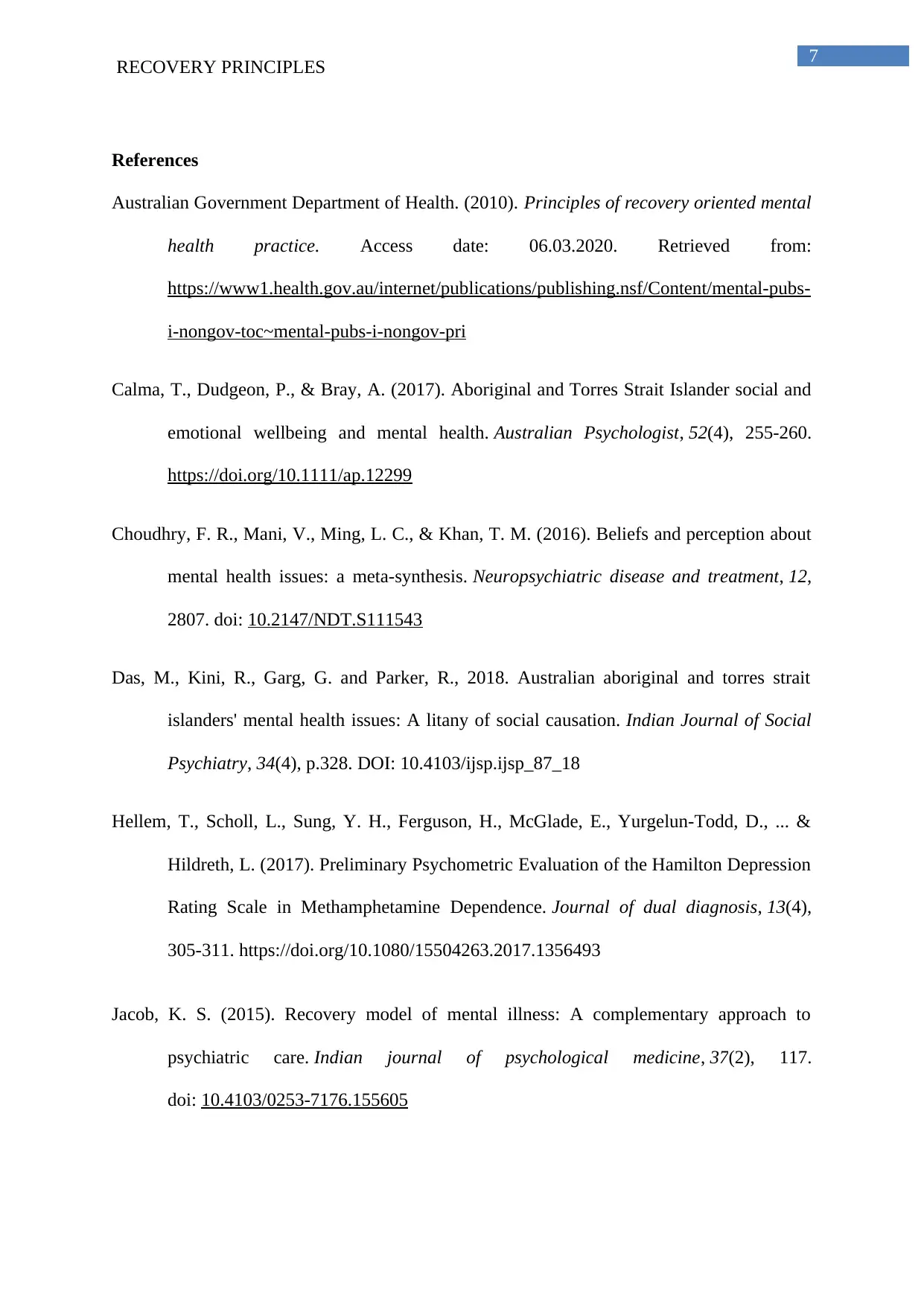
7
RECOVERY PRINCIPLES
References
Australian Government Department of Health. (2010). Principles of recovery oriented mental
health practice. Access date: 06.03.2020. Retrieved from:
https://www1.health.gov.au/internet/publications/publishing.nsf/Content/mental-pubs-
i-nongov-toc~mental-pubs-i-nongov-pri
Calma, T., Dudgeon, P., & Bray, A. (2017). Aboriginal and Torres Strait Islander social and
emotional wellbeing and mental health. Australian Psychologist, 52(4), 255-260.
https://doi.org/10.1111/ap.12299
Choudhry, F. R., Mani, V., Ming, L. C., & Khan, T. M. (2016). Beliefs and perception about
mental health issues: a meta-synthesis. Neuropsychiatric disease and treatment, 12,
2807. doi: 10.2147/NDT.S111543
Das, M., Kini, R., Garg, G. and Parker, R., 2018. Australian aboriginal and torres strait
islanders' mental health issues: A litany of social causation. Indian Journal of Social
Psychiatry, 34(4), p.328. DOI: 10.4103/ijsp.ijsp_87_18
Hellem, T., Scholl, L., Sung, Y. H., Ferguson, H., McGlade, E., Yurgelun-Todd, D., ... &
Hildreth, L. (2017). Preliminary Psychometric Evaluation of the Hamilton Depression
Rating Scale in Methamphetamine Dependence. Journal of dual diagnosis, 13(4),
305-311. https://doi.org/10.1080/15504263.2017.1356493
Jacob, K. S. (2015). Recovery model of mental illness: A complementary approach to
psychiatric care. Indian journal of psychological medicine, 37(2), 117.
doi: 10.4103/0253-7176.155605
RECOVERY PRINCIPLES
References
Australian Government Department of Health. (2010). Principles of recovery oriented mental
health practice. Access date: 06.03.2020. Retrieved from:
https://www1.health.gov.au/internet/publications/publishing.nsf/Content/mental-pubs-
i-nongov-toc~mental-pubs-i-nongov-pri
Calma, T., Dudgeon, P., & Bray, A. (2017). Aboriginal and Torres Strait Islander social and
emotional wellbeing and mental health. Australian Psychologist, 52(4), 255-260.
https://doi.org/10.1111/ap.12299
Choudhry, F. R., Mani, V., Ming, L. C., & Khan, T. M. (2016). Beliefs and perception about
mental health issues: a meta-synthesis. Neuropsychiatric disease and treatment, 12,
2807. doi: 10.2147/NDT.S111543
Das, M., Kini, R., Garg, G. and Parker, R., 2018. Australian aboriginal and torres strait
islanders' mental health issues: A litany of social causation. Indian Journal of Social
Psychiatry, 34(4), p.328. DOI: 10.4103/ijsp.ijsp_87_18
Hellem, T., Scholl, L., Sung, Y. H., Ferguson, H., McGlade, E., Yurgelun-Todd, D., ... &
Hildreth, L. (2017). Preliminary Psychometric Evaluation of the Hamilton Depression
Rating Scale in Methamphetamine Dependence. Journal of dual diagnosis, 13(4),
305-311. https://doi.org/10.1080/15504263.2017.1356493
Jacob, K. S. (2015). Recovery model of mental illness: A complementary approach to
psychiatric care. Indian journal of psychological medicine, 37(2), 117.
doi: 10.4103/0253-7176.155605
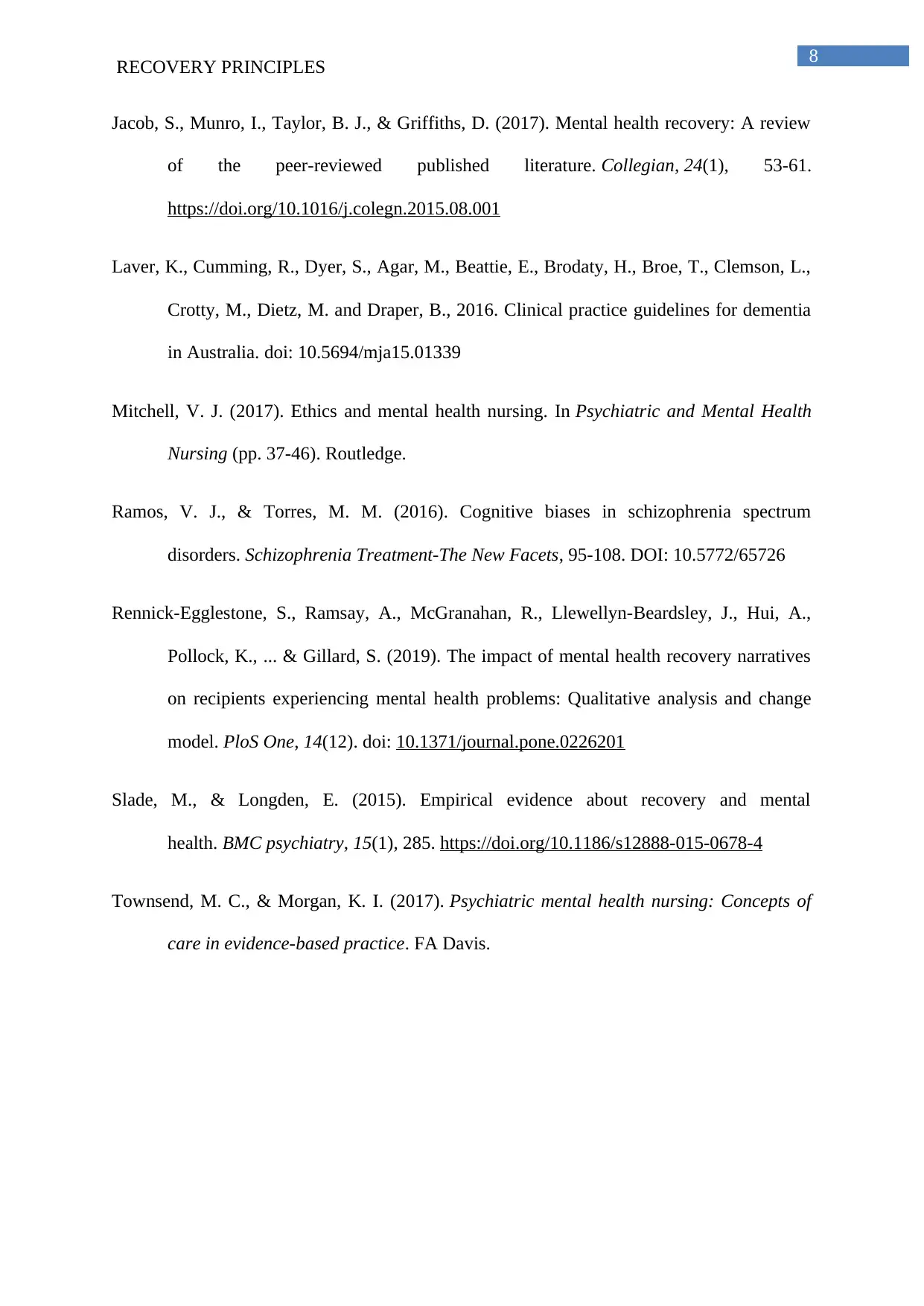
8
RECOVERY PRINCIPLES
Jacob, S., Munro, I., Taylor, B. J., & Griffiths, D. (2017). Mental health recovery: A review
of the peer-reviewed published literature. Collegian, 24(1), 53-61.
https://doi.org/10.1016/j.colegn.2015.08.001
Laver, K., Cumming, R., Dyer, S., Agar, M., Beattie, E., Brodaty, H., Broe, T., Clemson, L.,
Crotty, M., Dietz, M. and Draper, B., 2016. Clinical practice guidelines for dementia
in Australia. doi: 10.5694/mja15.01339
Mitchell, V. J. (2017). Ethics and mental health nursing. In Psychiatric and Mental Health
Nursing (pp. 37-46). Routledge.
Ramos, V. J., & Torres, M. M. (2016). Cognitive biases in schizophrenia spectrum
disorders. Schizophrenia Treatment‐The New Facets, 95-108. DOI: 10.5772/65726
Rennick-Egglestone, S., Ramsay, A., McGranahan, R., Llewellyn-Beardsley, J., Hui, A.,
Pollock, K., ... & Gillard, S. (2019). The impact of mental health recovery narratives
on recipients experiencing mental health problems: Qualitative analysis and change
model. PloS One, 14(12). doi: 10.1371/journal.pone.0226201
Slade, M., & Longden, E. (2015). Empirical evidence about recovery and mental
health. BMC psychiatry, 15(1), 285. https://doi.org/10.1186/s12888-015-0678-4
Townsend, M. C., & Morgan, K. I. (2017). Psychiatric mental health nursing: Concepts of
care in evidence-based practice. FA Davis.
RECOVERY PRINCIPLES
Jacob, S., Munro, I., Taylor, B. J., & Griffiths, D. (2017). Mental health recovery: A review
of the peer-reviewed published literature. Collegian, 24(1), 53-61.
https://doi.org/10.1016/j.colegn.2015.08.001
Laver, K., Cumming, R., Dyer, S., Agar, M., Beattie, E., Brodaty, H., Broe, T., Clemson, L.,
Crotty, M., Dietz, M. and Draper, B., 2016. Clinical practice guidelines for dementia
in Australia. doi: 10.5694/mja15.01339
Mitchell, V. J. (2017). Ethics and mental health nursing. In Psychiatric and Mental Health
Nursing (pp. 37-46). Routledge.
Ramos, V. J., & Torres, M. M. (2016). Cognitive biases in schizophrenia spectrum
disorders. Schizophrenia Treatment‐The New Facets, 95-108. DOI: 10.5772/65726
Rennick-Egglestone, S., Ramsay, A., McGranahan, R., Llewellyn-Beardsley, J., Hui, A.,
Pollock, K., ... & Gillard, S. (2019). The impact of mental health recovery narratives
on recipients experiencing mental health problems: Qualitative analysis and change
model. PloS One, 14(12). doi: 10.1371/journal.pone.0226201
Slade, M., & Longden, E. (2015). Empirical evidence about recovery and mental
health. BMC psychiatry, 15(1), 285. https://doi.org/10.1186/s12888-015-0678-4
Townsend, M. C., & Morgan, K. I. (2017). Psychiatric mental health nursing: Concepts of
care in evidence-based practice. FA Davis.
⊘ This is a preview!⊘
Do you want full access?
Subscribe today to unlock all pages.

Trusted by 1+ million students worldwide
1 out of 9
Related Documents
Your All-in-One AI-Powered Toolkit for Academic Success.
+13062052269
info@desklib.com
Available 24*7 on WhatsApp / Email
![[object Object]](/_next/static/media/star-bottom.7253800d.svg)
Unlock your academic potential
Copyright © 2020–2026 A2Z Services. All Rights Reserved. Developed and managed by ZUCOL.





